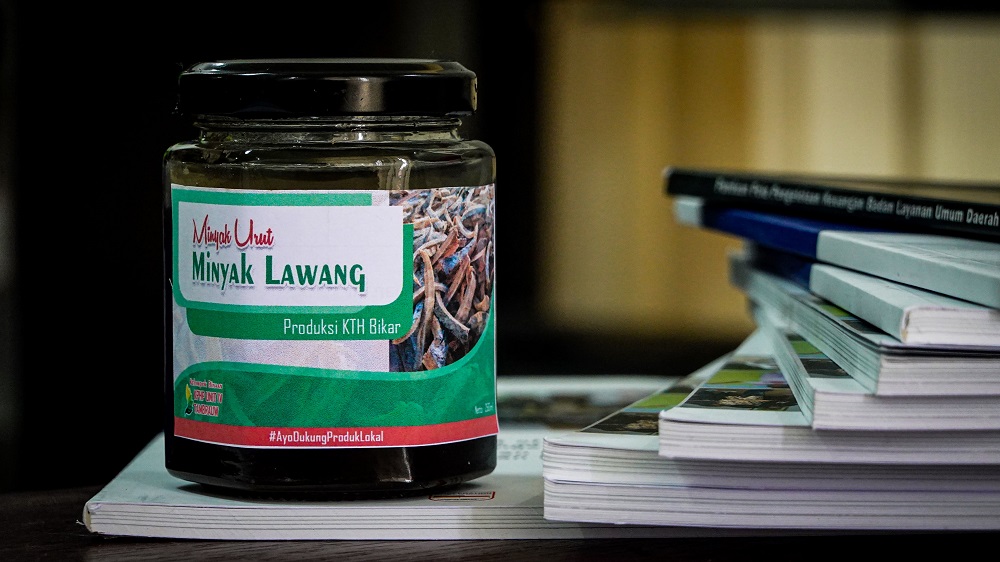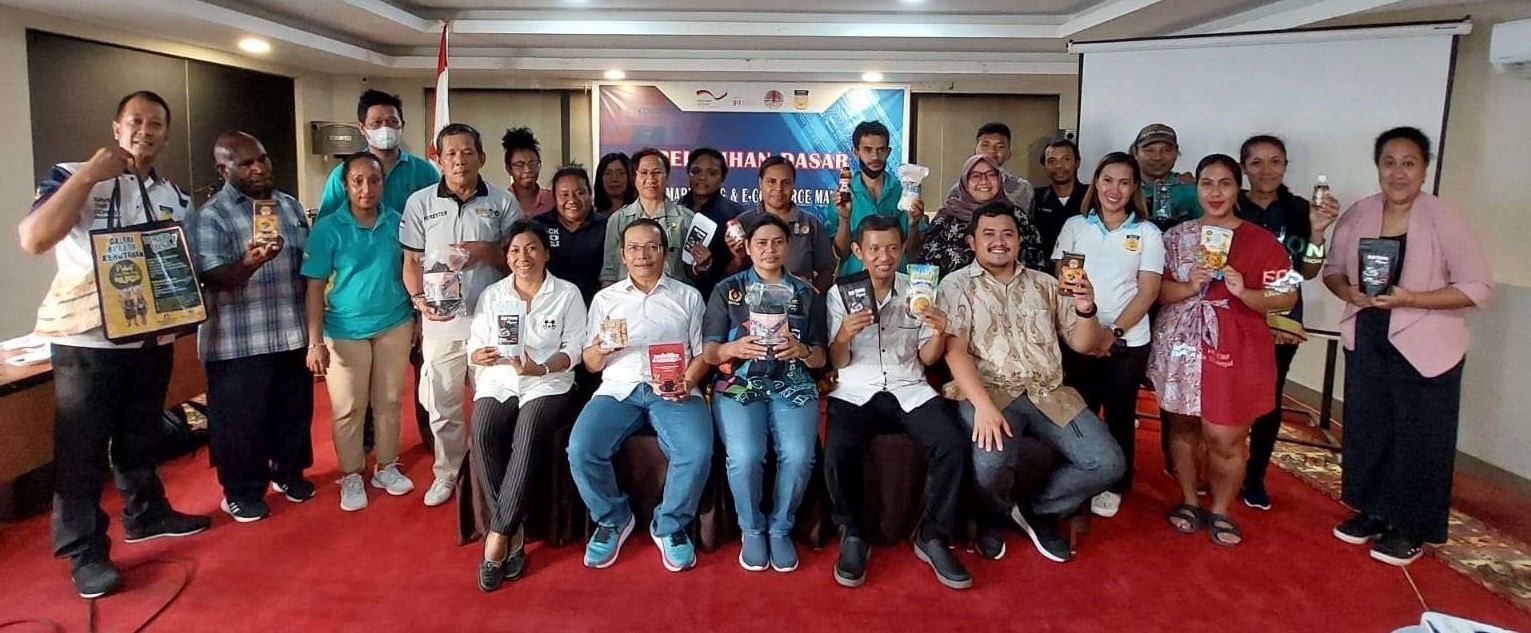FORCLIME
Forests and Climate Change ProgrammeTechnical Cooperation (TC Module)

Select your language

The Forest Farmers Group (KTH) in the village of Bikar is one of the KTHs that is being facilitated by Tambrauw Production Forest Management Unit (KPHP) Unit IV in Bikar Village, Tambrauw Regency, West Papua. This village works with several potential non-timber forest products (NTFPs), one of which is lawang oil, which is produced from mace trees (Cinnamomum culilawan). Lawang oil, an essential oil rich in eugenol, is believed to be an effective external medicine capable of relieving aches and pains and the symptoms of rheumatism, as well as accelerating the healing of wounds. Cinnamomum culilawan bark has been used for generations and managed traditionally by the people of Bikar. Usually, farmers require four to five days to produce this oil. The oil itself is processed in the forest at a location that can be reached from the village in one to two days. As a result, farmers usually camp in the forest. The lawang oil that is ultimately produced is sold to collectors in Sorong City in 5-liter jerrycans at prices that range from IDR 350,000 – IDR 400,000.
Based on the conditions outlined above, it is clear that the effort (energy, time, costs) expended by KTH is currently greater than the results obtained. As a result, more effective and efficient processing and marketing are needed so that farmers can enjoy improved benefits. For this reason, Tambrauw Production Forest Management Unit (KPHP) Unit IV, supported by FORCLIME, held a training session on the processing of essential oil and product packaging with an eye on improved product management. The training session was held from 1 - 2 December 2022 in Bikar Village, Tambrauw Regency and was attended by the Bikar Forest Farmers Groups, specifically 19 males and eight females.
The essential oil that is produced is packaged in ± 100 ml glass bottles. Meanwhile, the design of the product labelling highlights the identity of KTH Bikar as a group of NTFP owners and users and KPHP IV Tambrauw as the manager of the location.
One of the challenges associated with the production of essential oil through traditional processing is that the oil is not yet clear. In addition, to produce the oil, the community is still required to cut down trees. This means that the production system is unsustainable. In response to these challenges, KPHP IV Tambrauw and forest farmer groups have incorporated a programme that addresses the cultivation and planting of lawang trees into the Forest Farmers Group Work Plan. Through this plan, after the harvesting of the lawang tree has been completed, the farmers plant new trees to substitute for the ones that were cut down. This programme is implemented as a group. Meanwhile, in order to produce clearer oil, training sessions on product clarification are planned, while training sessions on product marketing will also be held.
For more information, please contact:
Melanesia Brigite Boseren, Junior Advisor for Rural Livelihood, Forest Management and Conservation
Mohammad Sidiq, Strategic Area Manager for Sustainable Forest Management and Coordinator for Papua and West Papua Provinces

One type of capacity building that local entities usually require is business development. In this regard, the Forestry and Environment Service (Dinas KLH) of Papua Province, supported by FORCLIME, recently held a number of sessions that addressed Basic Training and Coaching on Digital Marketing and eCommerce Management. Under the umbrella of this program, basic training sessions were held from 25 - 28 October 2022 while coaching sessions were held in Jayapura from 23 - 25 November. A total of 40 participants attended these two groups of activities and were representing forest management units (KPH and CDK) working within Papua Province, as well as a number of managers from the Forestry Creative Gallery and forest farmers groups from various FORCLIME-supported villages.
The training and coaching activities differed in several respects. During the basic training sessions, the trainers provided more material/theory-based input to the participants, whereas during the coaching sessions, the participants were expected to play a bigger role by practicing the material/theory that had previously been presented by the trainers.
“The Papua Provincial Government is organizing its forestry sector in an effort to maximize natural resources for communities living around forested areas. According to our data, when compared with timber forest products, which tend to damage forests, non-timber forest products (NTFPs) are more friendly in terms of their ability to protect the forest, however, billions of rupiah can also be generated through the successful management of NTFPs,” explained the Head of the Papua Provincial Forestry and Environment Service, Jan. Jap Ormuseray, S.H, M.Sc., during the opening of the training session. “From the resource personnel, we can learn digital marketing which will in turn help us to market the various NTFPs that are being fostered. This is a solution capable of increasing the incomes of local communities,” Mr. Ormuseray added.
Training participants received input on the following topics: Basic digital marketing, product marketing, social media optimization and eCommerce management through the marketplace.
After the completion of the basic training, further training and mentoring activities will be held in 2023.
For more information, please contact:
Wira Hakim, Advisor for Human Capacity Development
Edy Marbyanto, Strategic Area Manager for Human Capacity Development

The Emmaus Forest Farmers Group in Emaus Village is located in the Sausapor sub-District and is one of the forest farmers groups (KTH) that is being assisted by Tambrauw Production Forest Management Unit (KPHP) Unit IV. KTH Emmaus is also one of the farmers groups that are actively carrying out rehabilitation activities in relation to degraded land. Located along the coast of Sausapor, Kampung Emaus cultivates candlenut trees (Aleurites moluccanus), which grow naturally within the coastal area and in local community plantations. Abundant in nature, the candlenut is processed in a simple way as a spice in the form of seeds and is sold in traditional markets. However, to improve the household economy of the community (KTH members), it is necessary to diversify derivative products to be sold in various markets.
As a result, the Tambrauw KPHP Unit IV, in conjunction with KTH Emaus and supported by FORCLIME, held training sessions on making candlenut oil products to be used as hair masks from 28 – 29 November 2022. In addition, during these training sessions, the participants (who comprised 21 males and 36 females) also received training in how to make packaging for the hazelnut oil that they produce. The oil produced is packaged in 250 ml bottles, to which labels that show the identity of KTH Emmaus and Tambrauw KPHP Unit IV are attached.
In the wake of the completion of these training sessions, the produced oil will be put through processes of clinical testing prior to the KTH receiving assistance in its effort to secure a sales permit, namely the Household Product Permit (IPRT), before the products that are being produced are ultimately able to be sold. Another follow-up activity in this area involves training on product marketing, both traditionally and online (marketplace).
For more information, please contact:
Melanesia Brigite Boseren, Junior Advisor for Rural Livelihood, Forest Management and Conservation
Nita Yohana, Adviser for Sustainable Forest Management and Coordinator for West Papua Province
Mohammad Sidiq, Strategic Area Manager for Sustainable Forest Management and Coordinator for Papua and West Papua Provinces


